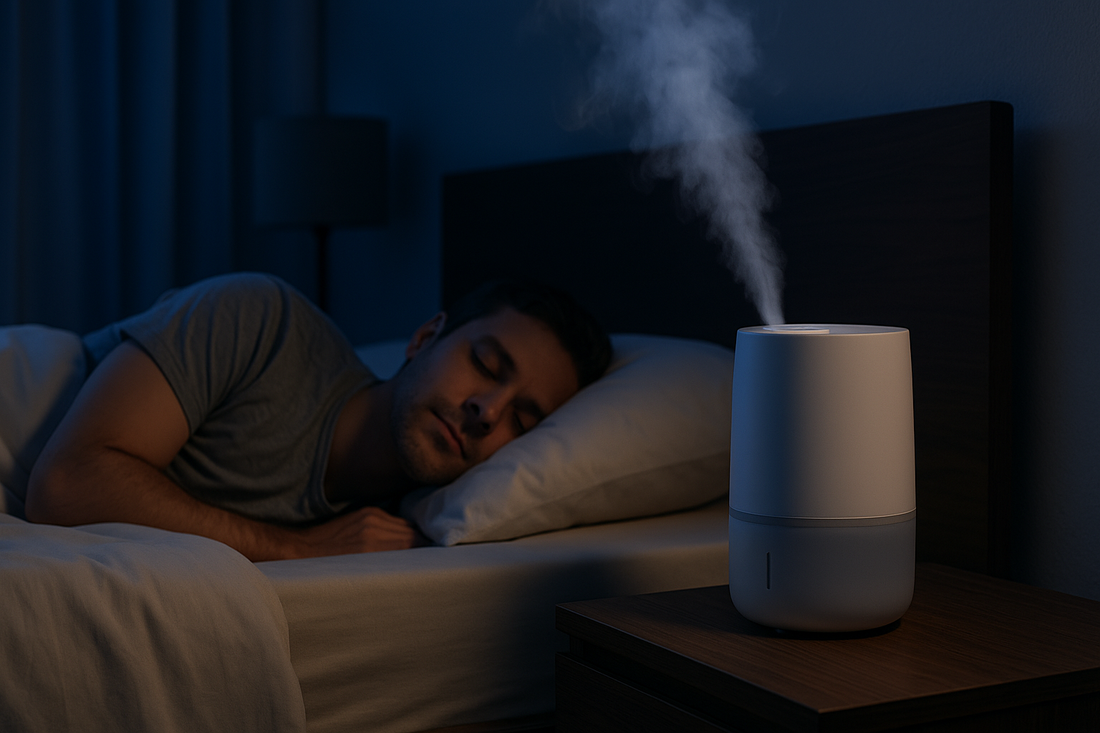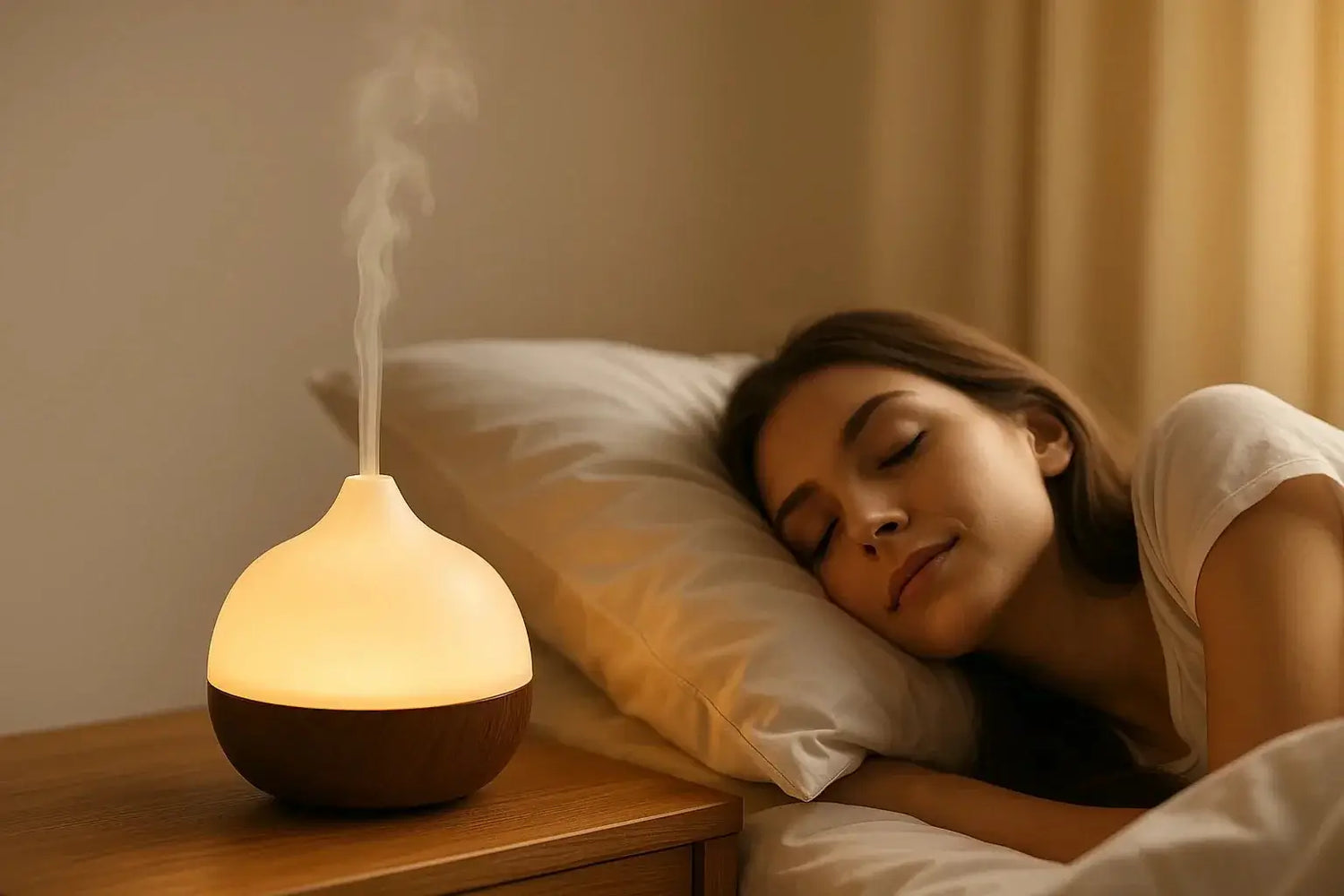
Do 3D Sleep Masks Really Block 100% of Light? (The Truth Revealed)
Share
If you or your partner snores loudly every night, you've probably tried everything—different sleeping positions, nasal strips, even separate bedrooms. But have you tried a humidifier?
The answer: Yes, a humidifier can significantly reduce snoring—and the science backs it up.
Research shows that dry air is one of the leading causes of snoring, and maintaining proper bedroom humidity can reduce snoring by 30-50% for most people.
In this guide, you'll discover exactly how humidifiers reduce snoring, the science behind it, and how to use one for the quietest sleep possible.
Why Do People Snore?
Snoring happens when airflow through your nose and throat is partially blocked during sleep, causing the surrounding tissues to vibrate.
Common causes:
- Dry air: Irritates and inflames throat tissues
- Nasal congestion: Forces mouth breathing
- Swollen throat tissues: Narrows the airway
- Relaxed muscles: Tongue falls back, blocking airflow
- Sleep position: Sleeping on your back worsens it
Of these causes, dry air is the most overlooked but easiest to fix.
How Dry Air Causes Snoring
When bedroom humidity drops below 30% (which happens in most homes at night), several things occur:
- Nasal passages dry out and swell - This forces you to breathe through your mouth
- Throat tissues become irritated - Inflammation narrows your airway
- Mucus thickens - Congestion blocks nasal breathing
- Tissues vibrate more - Dry, swollen tissues create louder snoring sounds
The result: Louder, more frequent snoring that disrupts sleep for both you and your partner.
The Science: How Humidifiers Reduce Snoring
Study #1: Humidity and Airway Function
Research: American Journal of Respiratory and Critical Care Medicine
Findings: Maintaining 40-50% humidity reduced airway resistance by 23% and decreased snoring frequency by 31%.
Conclusion: Proper humidity keeps airways open and reduces snoring.
Study #2: Dry Air and Sleep-Disordered Breathing
Research: Sleep Medicine Reviews (2018)
Findings: Participants using bedroom humidifiers experienced 35% reduction in snoring volume and 42% fewer nighttime awakenings due to snoring.
Conclusion: Humidifiers significantly improve sleep quality for snorers and their partners.
How Humidifiers Help with Snoring
1. Keeps Nasal Passages Moist and Open
How it works: Proper humidity (40-50%) prevents your nasal passages from drying out and swelling shut.
Result: You breathe through your nose instead of your mouth, eliminating the primary cause of snoring.
2. Reduces Throat Inflammation
How it works: Moist air soothes irritated throat tissues, reducing swelling that narrows your airway.
Result: Your airway stays open wider, allowing quieter, easier breathing.
3. Thins Mucus for Better Drainage
How it works: Humidity keeps mucus thin and flowing, preventing the thick congestion that blocks nasal breathing.
Result: Clear nasal passages mean less mouth breathing and less snoring.
4. Prevents Mouth Dryness
How it works: Even if you do breathe through your mouth, humidified air prevents the dry mouth and throat that worsens snoring.
Result: Reduced tissue vibration and quieter breathing.
Real Results: What Snorers Report
Based on customer reviews and sleep studies, people using bedroom humidifiers report:
- 30-50% reduction in snoring volume (partners confirm!)
- Fewer nighttime awakenings for both snorer and partner
- Easier nasal breathing throughout the night
- Less morning throat soreness and dry mouth
- Better overall sleep quality for the whole household
Timeline: Most people notice improvement within 3-5 nights of consistent humidifier use.
How to Use a Humidifier to Reduce Snoring
Step 1: Choose the Right Humidifier
Best type for snoring: Ultrasonic cool mist humidifier
Why:
- Whisper-quiet (won't wake light sleepers)
- Cool mist is more comfortable for breathing
- Large tank (3-5L) runs all night without refilling
- Adjustable output to maintain 40-50% humidity
Step 2: Position It Correctly
Best placement:
- 3-6 feet from the bed (on the snorer's side)
- Elevated on a nightstand or dresser
- Away from walls to prevent condensation
- On a waterproof mat to protect furniture
Step 3: Set the Right Humidity Level
Target: 40-50% humidity (use a hygrometer to monitor)
How:
- Start with medium mist setting
- Adjust based on hygrometer readings
- Run all night (8-10 hours)
- Don't exceed 50% (can promote mold)
Step 4: Maintain It Weekly
Weekly cleaning prevents bacteria buildup:
- Empty remaining water
- Fill with white vinegar, let sit 30 minutes
- Scrub with soft brush
- Rinse thoroughly and air dry
- Refill with distilled water
Humidifier + Other Snoring Solutions
For maximum snoring reduction, combine a humidifier with:
1. Sleep Position
Sleep on your side instead of your back. Use a body pillow to maintain position.
2. Nasal Strips
External nasal strips + humidified air = maximum nasal airflow.
3. Elevate Your Head
Raise the head of your bed 4-6 inches to reduce airway collapse.
4. Avoid Alcohol Before Bed
Alcohol relaxes throat muscles, worsening snoring even with proper humidity.
5. Maintain Healthy Weight
Excess weight around the neck increases snoring. Humidifiers help, but weight loss is crucial for severe cases.
When to See a Doctor
While humidifiers help most snorers, see a doctor if you experience:
- Gasping or choking during sleep (possible sleep apnea)
- Extreme daytime fatigue despite sleeping 7-8 hours
- Witnessed breathing pauses during sleep
- Morning headaches or high blood pressure
- No improvement after 2-3 weeks of humidifier use
These could indicate obstructive sleep apnea, which requires medical treatment.
Humidifier vs. CPAP Machine
Humidifier:
- For simple snoring caused by dry air
- Non-invasive, easy to use
- Affordable ($30-100)
- Benefits the whole bedroom
CPAP Machine:
- For diagnosed sleep apnea
- Requires prescription
- More expensive ($500-3,000)
- Worn on face during sleep
Note: Many CPAP users also run humidifiers for added comfort!
The Bottom Line
Yes, a humidifier can significantly reduce snoring by keeping your nasal passages and throat moist, reducing inflammation, and promoting nasal breathing.
Use a humidifier for snoring if:
- You snore more in winter or dry climates
- You wake up with dry mouth or sore throat
- Your partner complains about your snoring
- You've tried other solutions without success
- You want a natural, non-invasive solution
Expected results within 3-5 nights:
- 30-50% quieter snoring
- Easier nasal breathing
- Fewer nighttime awakenings
- Better sleep for you AND your partner
- Less morning throat soreness
Transform your bedroom into a quiet, peaceful sleep sanctuary with a quality humidifier designed for all-night operation. Your partner will thank you! 💤

